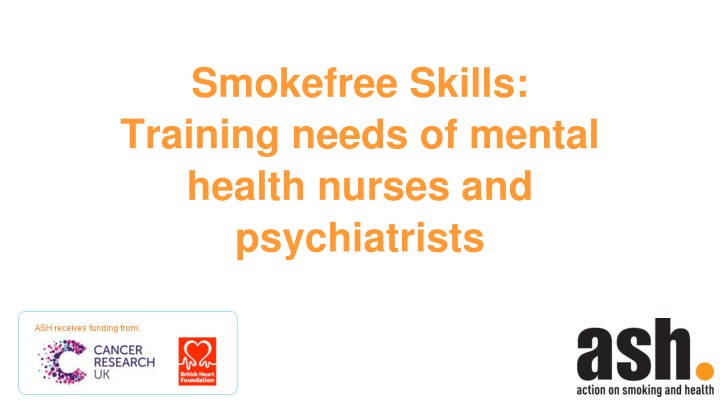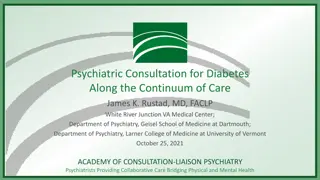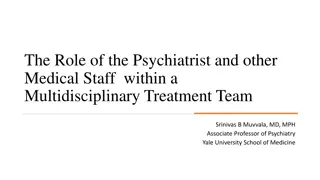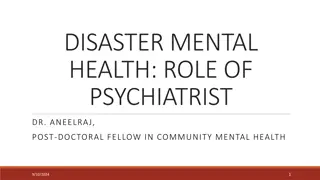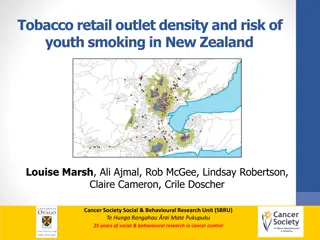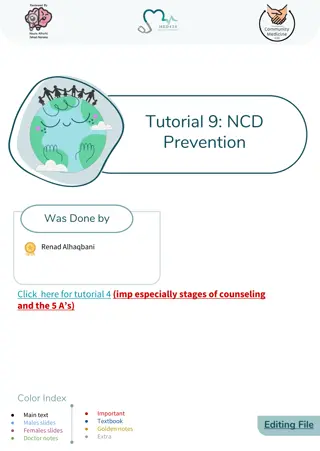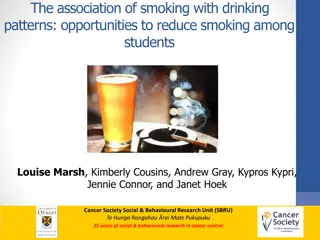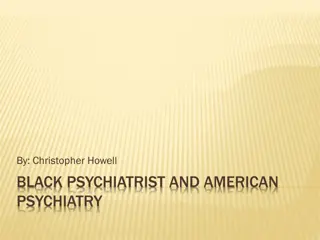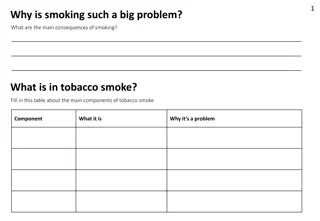Addressing Smoking Challenges Among Mental Health Nurses and Psychiatrists
This study explores the training needs and policy context for addressing smoking among individuals with severe mental illness. It highlights gaps in knowledge, enduring myths, and the high interest in additional training for mental health staff.
Download Presentation

Please find below an Image/Link to download the presentation.
The content on the website is provided AS IS for your information and personal use only. It may not be sold, licensed, or shared on other websites without obtaining consent from the author.If you encounter any issues during the download, it is possible that the publisher has removed the file from their server.
You are allowed to download the files provided on this website for personal or commercial use, subject to the condition that they are used lawfully. All files are the property of their respective owners.
The content on the website is provided AS IS for your information and personal use only. It may not be sold, licensed, or shared on other websites without obtaining consent from the author.
E N D
Presentation Transcript
Smokefree Skills: Training needs of mental health nurses and psychiatrists
I mean this notion of the poor mental health patient who you know, doesn't have much going for them and can only you know, the only joy in their life is their packet of cigarettes, it's like, and who am I to take that away from them I think it would be worth having some kind of training to challenge your own beliefs of people's potential it's just like a biased and slightly patronising viewpoint but at the same time it kind of represents the model of care that we're giving people, that the only solace they have is in a cigarette, which doesn't really reflect well on us (Consultant Psychiatrist)
Policy context Policy context Addressing smoking among people with SMI is a growing policy priority Five Year Fwd View NHS Long Term Plan Tobacco Control Plan for England Well trained staff more effective at addressing tobacco dependency Growing policy and political priority but are staff equipped to meet this challenge?
Method Method Many professions contribute to health outcomes for people with mental ill health but we only had capacity to focus on MH nurses and psychiatrists Focus groups Psychiatrists: two focus groups with 22 participants in total MH nurses: two focus groups with 15 participants in total Survey Survey ran in November 2020 265 respondents were included in final analysis
Headline findings Headline findings Staff are well informed about the health impacts of smoking BUT Lack of knowledge on key aspects of addressing smoking in patients including: medications, VBA and cessations options Training on smoking limited (or non-existent) across people s education and working life Enduring myths and negative attitudes about addressing smoking some linked to misperceptions of smokefree policies Additional organisational barriers to effectively addressing patients smoking outside of training barriers High level of interest in additional training and support for embedding training as mandatory
Overarching recommendations Overarching recommendations 1. A plan must be developed and implemented by NHSE to ensure training meets the requirements of implementing NICE guidance on smoking in both inpatient and community mental health settings. 2. As the NHS Long Term Plan commitments are rolled out in mental health settings gaps in training must be addressed in line with the detailed findings in this report.
Key findings: Current training Key findings: Current training Proportion of MHNs who have never had, or who can't remember having, training in the following smoking cessation support/interventions: 70.00% 7% 60.00% 50.00% 5% 4% 40.00% 2% 3% 30.00% 57% 46% 43% 20.00% 2% 33% 30% 10.00% 16% 0.00% Giving very brief advice (or ask, advice and act) Behavioural support for smoking cessation How to refer to smoking cessation services, or relevant smoking cessation lead Use of Nicotine Replacement Therapy Other smoking cessation medications i.e. Varenicline and Bupropion Use of e-cigarettes I have not had training on this topic I don't remember
Key findings: Current training Key findings: Current training Proportion of psychiatrists who have never had, or who can't remember having, training in the following areas of smoking cessation support/interventions: 80.00% 9% 10% 70.00% 60.00% 8% 50.00% 9% 9% 40.00% 67% 66% 6% 30.00% 55% 41% 20.00% 40% 28% 10.00% 0.00% Giving very brief advice (or ask, advice and act) Behavioural support for smoking cessation How to refer to smoking cessation services, or relevant smoking cessation lead Use of Nicotine Replacement Therapy Other smoking cessation medications i.e. Varenicline and Bupropion Use of e-cigarettes I have not had training on this topic I don't remember
Key quotes: Current training Key quotes: Current training Can I say I'm new to this Trust and I've never come across any teaching or training on this subject so what I've picked up, you know, I've picked up along the way, all by myself. (psychiatrist) I don't remember anything formal on that, it was kind of implicit in you know when a patient tells you, when they answer your question about smoking I mean I think it would be difficult to say we've had absolutely no suggestions made to us that we should ask, advice or act but you know whether there's formal training on it is another issue. (psychiatrist)
Key findings: Current training Key findings: Current training Clear appetite for more training to address smoking in people with mental health condition It was felt: Training should be compulsory in mental health academic programmes Training should be repeated at different points during professional careers It should be relevant/tailored to different settings esp community settings It should include real life stories It should relate smoking cessation to mental health not just physical health Barriers included Being unaware of what training is available Lack of time/workload too high Training not being provided at workplace
Recommendations: Improving existing training provision nationally 3. Standard setting institutions including the Nursing and Midwifery Council and the Royal College of Psychiatrists, should identify how they can best support academic institutions to include appropriate content on smoking in their curricula. This needs to deliver adequate levels of knowledge and skills at undergraduate and postgraduate level. 4. Health Education England and NHSE should ensure that standard training formats are developed and updated for NHS trusts to use for staff education and training purposes. 5. Any future training plans should set out how necessary training will be provided for community as well as inpatient mental health staff to enable more extensive support of patients outside of hospital admissions.
Key findings: Existing knowledge and skills Key findings: Existing knowledge and skills Apparent lack of understanding about what constitutes VBA Lack of knowledge about the use of e-cigarettes Lack of knowledge amongst psychiatrists on the use of Varenicline and referral pathways
Key findings: Existing knowledge and skills Key findings: Existing knowledge and skills the blindness that there is of actually seeing somebody who s in tobacco dependence withdrawal and not recognising it for what it is, is causing a lot of people to get bucket loads of medication they don't need, perphenazine and all the rest, and causing people to be on high doses of medication they don't need (MHN) I work out in the community and I don't know how to refer anyone to a smoking cessation service . (Psych)
Recommendations: Improving knowledge and skills in current staff 6. NHS Trusts, as part of implementing NICE PH48, must train staff to deliver each part of Very Brief Advice. This training should be for staff in both inpatient and community settings and include information about local pathways. 7. NHS Trusts should ensure that training on stop smoking medications is regularly updated for all mental health prescribers to ensure they can safely support smokers. 8. NHS Trusts should ensure staff have the knowledge around e-cigarettes and stop smoking medications in order to confidently support patients to make positive choices.
Key findings: Staff beliefs and attitudes Key findings: Staff beliefs and attitudes While smoking was a widely acknowledged health risk this did not translate into universal support for smokefree policies Some conflict was perceived between addressing smoking and other health concerns e.g. recovery from complex acute mental health episodes Smoking was perceived as facilitative by some with a role to play in mental health settings. Staff did not always recognise that they had responsibilities beyond recording smoking status.
Key findings: Staff beliefs and attitudes Key findings: Staff beliefs and attitudes the impacts of health complications or smoking are causing high rates of morbidity and mortality in this group. This is avoidable and we should be tackling it. (psych) I think this is a very important subject which improves clients quality of life and their health (MHN) Whilst completely supporting training for staff and all assertive supportive measures to help patients stop smoking, I believe that the smoking ban in hospitals is immoral, overly authoritarian and deeply damaging to the engagement and therapeutic care of many patients. I wholeheartedly oppose it. (psych)
Recommendations: Addressing staff attitudes and beliefs 9. Those developing training programmes should ensure that programmes include information on the role of different staff in tackling smoking and information to improve awareness that very brief advice can take as little as 30 seconds to deliver 10.Training programmes should also seek to improve staff attitudes, gaps in knowledge and prevailing culture. As such they need to: Provide information on smoking that is tailored to mental health settings and reflects the core values of mental health professionals Ensure training formats promote reflective practice: e.g. including peer led sessions on myths and culture, using mentorship to support reflection and learning Involve service users and their stories about smoking and quitting
Key findings: Organisational barriers Key findings: Organisational barriers Lack of consistent support across pathways and services is evident Community staff didn t always see the relevance of smokefree guidance which was often written with inpatient settings in mind Training can improve organizational barriers but its impact is also limited by these inhibiting factors
Key findings: Organisational barriers Key findings: Organisational barriers for a lot of patients it was a surprise when they got to hospital that they weren't allowed to smoke, and I think those clinicians that were working in the community or gatekeeping beds and treatments etc, I think they can sometimes choose not to share that information to make that pathway in easier for them and the individual, and then you know, it sits with us on the wards (MHN)
Recommendations: Tackling organisational barriers 11.NHS Trusts must ensure that training reflect the organisational realities for professionals and equip them to understand their local policies and services and manage organisational barriers. Specifically, training should: o Be tailored for staff in community settings covering the specific issues which they might face in addition to local pathways and smokefree policies o Include content on how inpatient smokefree policies operate and how to learn from breaches of the policy to improve outcomes for patients 12.Leaders and frontline staff should receive training relevant to their role on the impact of smoking and actions needed to support quitting. 13.NHS Trusts need to enable a supportive organisational culture through consistent implementation of NICE PH48 and their corresponding smokefree policies. Clear communication is needed of these policies to all staff members and their role within this policy. This must include bank and agency staff and be reinforced through senior leadership
Recommendations: Ensuring good practice is sustained over time 14.CQC should review their guidance to inspectors to emphasise the importance of staff training and ensure greater consistency in both inpatient and community settings. 15.NHS Trusts must ensure that training is repeated regularly throughout the career of mental health professionals through a combination of e-learning and face to face methods. Core training should be face to face (including via online classroom formats where necessary) with knowledge and skills maintained through e-learning platforms. 16.NHS Trusts should ensure that workplace training is multidisciplinary where possible and includes an understanding of the different roles difference health professionals should play in addressing a patient s smoking. 17.National investment should be secured to ensure that trusts and academic institutions have appropriate evidence-based, consistent training accessible for all professionals.
